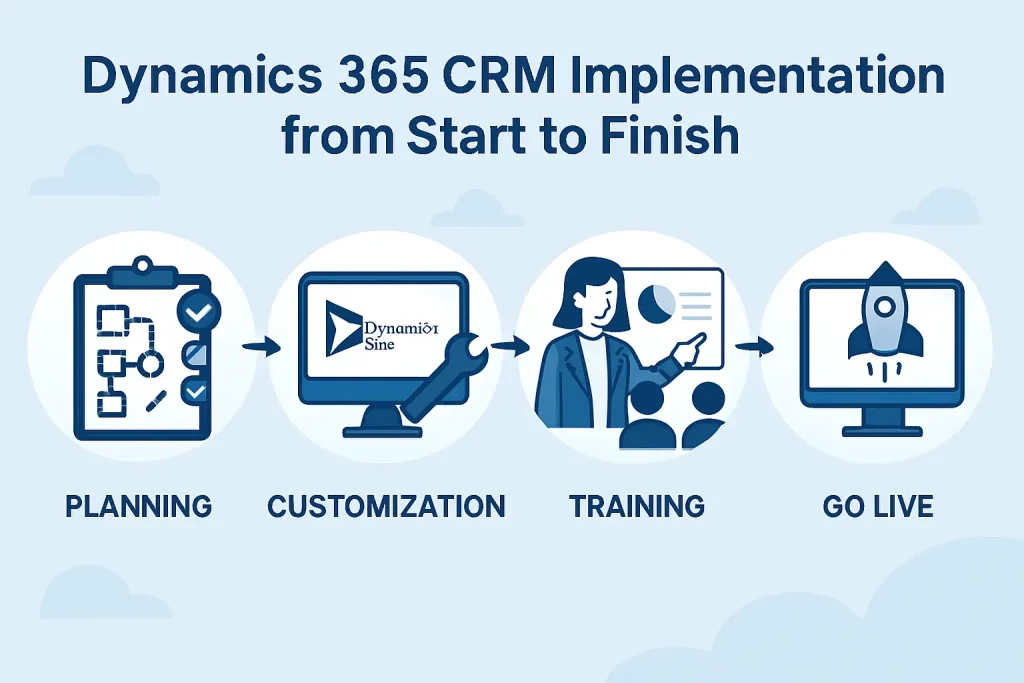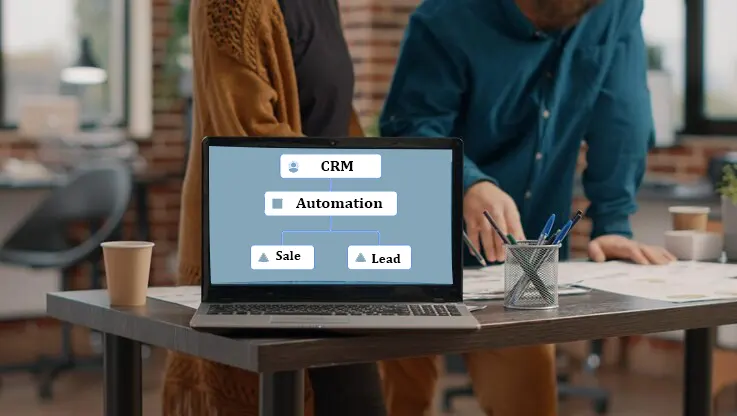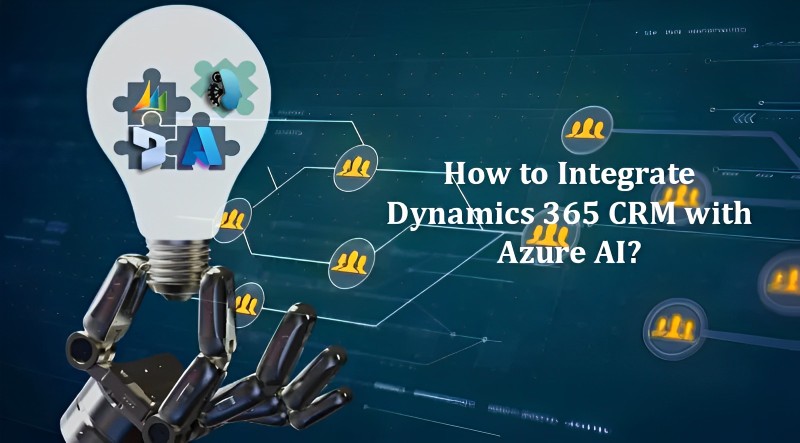INTRODUCTION
The rapidly changing business environment compels organisations to adopt efficient tools that effectively handle various operations, such as customer relationship management. The choice between Microsoft Dynamics 365 ERP and CRM solutions requires careful assessment of these business tools because their functions complicate the selection process. Organisations have to understand the fundamental difference between ERP and CRM in order to achieve operational optimisation. The following blog provides Microsoft Dynamics CRM vs ERP comparison with extensive information about their capabilities, advantages, and market applications.
Understanding Dynamics 365 CRM and ERP
Before studying their differences, the reader needs to grasp the features provided by Dynamics 365 CRM services and ERP systems.
What is CRM?
The customer relationship management (CRM) system implements identification and marketing techniques to build organisational customer bonds. Select the right CRM system for your business to creates strong customer relationships by centrally storing data in a single system for automated communication processes.
Key Features of CRM:

- Sales Automation The system maintains sales automation capabilities to handle leads combined with opportunities and forecasting.
- Customer Service Management The application implements functionality for managing customer service to enhance both customer support operations and ticket management systems.
- Marketing Automation The system allows users to run personalised marketing campaigns and segment clients through its automation features.
- Data analytics provides insights into customer behavior and preferences.
Benefits of Using Microsoft Dynamics 365 CRM

Investing in Microsoft Dynamics 365 CRM services, can yield several benefits:
- Enhanced Customer Relationships: Provides a 360-degree view of customer interactions.
- Automated Sales Processes: The automated tools in sales processes help companies improve their lead management system while following up leads and forecasting revenue.
- Personalised Marketing Campaigns: Targeted marketing campaigns become possible when customer groups are segmented using this system.
- Improved Customer Support: Enables quick ticket resolution and service management.
What is ERP?
Enterprise Resource Planning (ERP) serves as an integrated system to unite primary business operations under one unified platform. ERP acts as a centralised platform that improves the management of finance, supply chains, manufacturing, and human resources operations. ERP systems exist to enhance operational effectiveness by lowering expenses while giving immediate monitoring capabilities.
Key Features of ERP:

- Financial Management: The financial management system helps users track expenses, manage employee expense reimbursements, create budgets, and handle accounting and report distribution tasks
- Supply Chain Management: Supply Chain Management improves operations for inventory management as well as procurement and logistics.
- Human Resource Management: Manages employee data, payroll, and performance.
- Manufacturing Automation: Through manufacturing automation systems organisations improve their production management processes.
Benefits of Using Microsoft Dynamics 365 ERP

Opting for Dynamics CRM services for ERP offers the following advantages:
- Efficient Financial Management: Streamlines budgeting, expense tracking, and compliance.
- Optimised Supply Chain: Through optimised supply chains, inventory is better while demand forecasting experiences enhancement.
- Data-Driven Decision-Making: Provides real-time insights into business performance.
- Regulatory compliance: Dynamics CRM services for ERP help organisations follow both industrial standards and tax regulations.
ERP VS CRM Software – How Are They Related?
ERP and CRM software solutions provide identical management capabilities for contacts, quotes, and companies, as well as orders and forecasts. ERP and CRM software solutions provide identical management capabilities for contacts, quotes, companies, and orders. Businesses often feel confused about the difference between ERP and CRM, but both systems work together for seamless operations.
These systems enable users to manage delivery schedules along with line-item configurations, bundles, invoices, and other elements. Companies tend to feel confused about these programs, but they fail to realise that the features differ when the systems work together.
While on a sales call, a potential customer could express their struggle between buying an ERP or CRM system. The CRM system features are known to them, but they remain unknowing about ERP’s feature compatibility.
Difference Between ERP and CRM
Examining their fundamental features can help one understand the difference between ERP and CRM:

Microsoft Dynamics CRM vs ERP: A Detailed Comparison
1. Functionality & Purpose
- CRM functions as a customer-led system, which emphasizes sales operations along with service delivery and marketing activities. Through CRM businesses will better interact with customers, which enables better tracking of customer interactions and results in enhanced customer satisfaction.
- ERP focuses primarily on operational needs by managing financial resources alongside inventory management and human resource tasks. The system aims to enhance internal business processes while continuously maintaining operational efficiency.
2. Data Utilization
- CRM tracks customer interactions, sales pipelines, and service history. The system delivers critical data, which allows businesses to strengthen customer bonds through better sales strategies.
- ERP maintains control over financial operations together with business analysis and supply chain information. This system allows organisations to maintain precise records and operate with high efficiency across all areas of business.
3. Business Impact
- CRM boosts customer satisfaction along with revenue growth because it optimises marketing campaigns and sales results.
- ERP systems support operational efficiency and cost reduction through automated business processes and resource management capabilities.
4. User Base
- CRM (customer relationship management) serves as business software that sales teams, together with marketers and customer support representatives, use for interaction handling and tracking sales achievements.
- ERP benefits finance departments as well as HR teams and supply chain managers through its integrated system for managing business operations along with resource planning.
5. Integration & Scalability
- Both Microsoft Dynamics CRM vs ERP solutions can be integrated within Dynamics 365 services for a unified approach. Businesses can scale by combining CRM and ERP based on their needs, ensuring a cohesive and efficient workflow across departments.
6. Reporting & Analytics
- CRM enables users to gain knowledge about customer actions as well as marketplace fluctuations together with marketing effectiveness metrics. The system enables companies to use their information for data-based adjustments of their sales methods.
- ERP offers in-depth financial reports, operational data, and business intelligence. The system helps companies create budgets while generating forecasts; it also enables strategic choices across the entire organisational structure.
7. Price & Licensing Cost
- CRM system pricing depends on factors including user count, selected features, as well as customisation requirements. Users can access free CRM options, though most CRM solutions demand payments of thousands of dollars. The monthly expenditures for non-enterprise CRM systems fall between $20 and $80 for each user.
- ERP solutions require a higher investment than CRM because they come with extensive customisation features. The large financial outlay for ERP implementation includes professionals who must handle both planning and design aspects and application integration and maintenance. Cloud-based ERP solutions provide Microsoft Dynamics 365 at prices that start at $79 and extend to $799 per month.
8. Flexibility & Customization
- CRM provides businesses with the capability to design customer-specific engagement approaches, combined with personalised marketing, sales automation, and service sequencing.
- ERP offers customised modules for finance, human resource management, and supply chain management so organisations can adapt their systems to their individual operations.
9. Cloud & On-Premises Deployment
- CRM systems operate mostly through cloud deployments so users can access them remotely and adapt easily. A cloud deployment provides organisations with enhanced scalability while reducing their maintenance expenses.
- ERPs function as both cloud-based and on-premise programs that match business operational requirements. Businesses gain better on-premises deployment control, though they benefit from cloud-based ERP accessibility and quick system updates.
ERP VS CRM – Pros & Cons
Pros:
- Increased Efficiency: The combination of efficient processes in ERP modules leads to increased operational efficiency, which diminishes manual labor costs and maximises performance.
- Enhanced customer relations: The CRM modules within Dynamics 365 offer systems to interpret user habits for more personalised contact experiences, leading to increased customer devotion.
- Data-Driven Insights: Dynamics 365 uses data-driven analytics tools to provide organisations with valuable insights that support better administration choices.
Cons:-
- Complex Implementation: The implementation process for Dynamics 365 ERP modules is often complicated because it requires specialised professional assistance during the first phase.
- Costs: The organisation must spend time developing plans and budgets to cover customised work and training expenses, along with ongoing support costs, to achieve cost-effective adoption under the modular approach.
- User Adoption: The extensive feature range in Dynamics 365 produces a user adaptation challenge which reduces productivity during the first stages of implementation.
Microsoft Dynamics 365 CRM Comparison: Why Choose CRM?
When conducting a Microsoft Dynamics 365 CRM comparison, businesses should consider the following benefits:
- Improved Customer Engagement: CRM software enables personalized interactions and targeted marketing.
- Sales Automation: Helps sales teams track leads, manage pipelines, and close deals efficiently.
- Enhanced Reporting and Analytics: Provides insights into customer behavior and sales performance.
If you’re looking to integrate Dynamics 365 services into your business, it’s crucial to get expert support from Expert Microsoft Dynamics CRM developers who can ensure successful deployment and customization. You can hire Microsoft Dynamics 365 Finance and Operations apps developer to ensure a smooth implementation and maximise business efficiency.
Integration of ERP and CRM Systems
With the support of Dynamics CRM consulting services, businesses can improve operational efficiency and support enhanced customer relationships through their combination of Dynamics 365 CRM and ERP systems. Some benefits of integration include:
- ERP and CRM integration enables businesses to combine operational information with customer data, which results in improved departmental collaboration. Companies operating with a fully integrated system achieve better sales forecasting, optimised resource allocations, and efficient order processing.
- A real-time view of financial data and customer information supports efficient decision-making for operations involving both front-end and back-end systems. Business automation for crucial tasks, including invoicing, customer follow-ups, and inventory tracking, reduces manual work and increases productivity.
By integrating these systems, businesses achieve both satisfied customers with optimal stability in their financial position and operational framework.
When to Use CRM vs ERP: Which Is The Best For Your Business?
Before choosing between CRM and ERP, your organisation must first determine their implementation based on its operational needs.
Choose Dynamics 365 CRM if:
- Your business depends on sales expansion through customer connections.
- The system requires both marketing automation and lead tracking features.
- The enhancement of customer support and service quality stands among your business priorities.
Choose Dynamics 365 ERP if:
- Operating and managing finances with efficiency demands your business select Dynamics 365 ERP.
- Enterprises require organised systems for supply chain management and inventory control.
- You require a system that bases decisions on data.
Choose both CRM and ERP
- If Your Organisation Needs Perfect Alignment Between Customer Contacts Plus Your Business Implementation Systems.
Can CRM and ERP Work Together?
Yes! For businesses requiring both Dynamics 365 services, Microsoft Dynamics 365 offers seamless integration between CRM and ERP. This ensures:
- Unified Data Access: Real-time data updates occur through this solution, which removes data silos.
- Enhanced Collaboration: The system supports better team coordination between three main functions, including sales and finance and operations teams.
- Better Customer Insights: Links customer data with business transactions for improved decision-making.
Conclusion
Both Microsoft Dynamics CRM vs ERP play key roles in business management. The difference between ERP and CRM is that CRM specialises in customer relations, while ERP optimises internal processes. Businesses should evaluate their needs before choosing CRM, ERP, or both. Understanding the differences through a Microsoft Dynamics 365 CRM guide comparison will help you make an informed decision.
By leveraging Microsoft Dynamics 365 CRM implementation services, businesses can achieve digital transformation, streamline workflows, and improve customer satisfaction.
FAQ
1. Is Dynamics 365 a CRM or ERP?
Selection of ERP or CRM tools is possible through the Microsoft Dynamics 365 system.
2. Which elements separate CRM solutions from ERP technologies?
ERP controls financial, supply chain, and human resource operations, whereas CRM handles sales.
3. Does Microsoft have a CRM tool?
Yes, the customer contact system, together with sales functions and marketing abilities, is included in Microsoft Dynamics 365 CRM.
4. Can ERP and CRM be integrated?
Yes, A full system integration between Dynamics 365 CRM and ERP delivers better operational performance with strategic planning benefits to companies.
5. How do I choose between Dynamics 365 CRM and ERP?
Your company requires both CRM software to engage customers, while operations demand the implementation of ERP software.
Read More:



